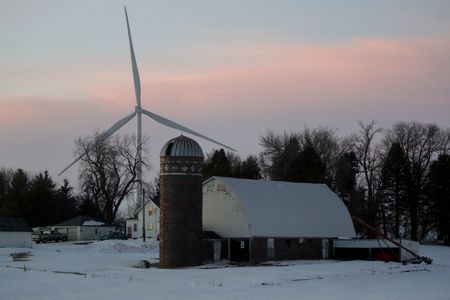By Leah Douglas
(Reuters) – A flurry of proposed carbon pipelines in the U.S. Midwest has triggered a battle over whether companies behind the projects should be allowed to seize land from unwilling property owners to secure a route.
Hundreds of Iowa landowners, more than a dozen state counties and a handful of lawmakers are seeking to limit the use of eminent domain law by the projects, arguing property rights and other concerns outweigh the potential benefits of the pipelines to local industry and the climate, according to a Reuters analysis of regulatory documents and interviews with people involved.
The issue has come to the forefront as the companies behind the projects seek to negotiate voluntary easements with landowners that would give them the legal right to dig, install and maintain the lines – which would transport carbon captured at biofuel processing plants for injection underground.
If the landowners refuse easements, the companies would need to turn to eminent domain to gain access to the land.
U.S. eminent domain law allows private companies to take over property if their project is deemed in the public interest and landowners are compensated. It has been used often to ensure energy companies can complete projects, like pipelines and transmission lines, that move oil, gas and power to consumers.
But the law has not yet been applied to carbon pipelines, which are primarily regulated and sited by states, rather than the federal government, according to the Department of Energy (DOE), and few of which have been constructed to date.
How state regulators and legislators deal with the issue will have huge implications for the emerging U.S. carbon capture and storage (CCS) industry. The Biden administration has identified CCS as critical infrastructure to meet the country’s climate targets and oil companies, biofuel producers, and other emissions-heavy businesses are eying investment in CCS as a way to secure a role in a climate-friendly future.
There are currently about 5,000 miles (8,047 km) of carbon dioxide pipelines in the United States, mainly in Texas and Wyoming, where the gas is pumped under oil and gas fields to increase pressure and boost production.
But developers would need to build another 65,000 miles for the country to permanently store enough carbon to reach net zero emissions by 2050, according to a 2021 report from the White House. (Click here for a FACTBOX on the state of the U.S. CCS industry)
“It’s pretty important for (CCS pipelines) to be successful if we want to achieve our climate goals,” said Matt Fry, state and regional policy manager for carbon management at the Great Plains Institute. “We have to start somewhere.”
TALKS UNDER WAY
Three companies – Summit Carbon Solutions, Navigator Ventures and Wolf Carbon Solutions – have together proposed 3,650 miles (5,874 km) of new pipelines to cut across the Midwest and eventually transport 39 million tons of captured carbon annually from ethanol and fertilizer plants to storage sites in North Dakota and Illinois.
The projects would generate revenue from existing federal and state subsidies for CCS and low-carbon fuels, as well as fees from participating facilities that are eager to mitigate their climate impact.
Iowa would get the bulk of pipeline miles – more than 1,600 miles, or 48%, of Summit and Navigator’s pipelines. The state’s utility regulator, the Iowa Utilities Board (IUB), will ultimately decide whether to permit the projects and grant them the right to use eminent domain.
Summit last month was the first of the pipelines to petition the IUB for a permit and the right to use eminent domain. The application did not, however, contain a required filing on how much land Summit planned to secure with eminent domain.
Summit told Reuters in a statement it had not included the filing because it is currently focused on getting voluntary easements with landowners.
The IUB did not respond to a request to comment.
Summit has signed easements with several hundred landowners so far, Chief Operating Officer Jimmy Powell said. But he did not respond to a question about how much of the pipeline route that represented.
Many landowners along the route have refused to sign easements with Summit, citing concerns about farmland productivity and land values after the pipeline is installed, according to previous Reuters reporting https://www.reuters.com/markets/commodities/giant-pipeline-us-midwest-tests-future-carbon-capture-2021-11-23.
Navigator said in a statement that it has not begun talking to landowners about easements yet. Wolf Carbon Solutions did not respond to a request for comment.
In the meantime, Iowans are worried.
Twenty counties in Iowa have filed objections with the IUB opposing the use of eminent domain for the pipelines, including 52% of counties along the Summit pipeline’s proposed route and 41% of the counties along Navigator’s proposed route, according to the Reuters review of the docket.
Ty Rosburg, vice chair of the board of supervisors of Crawford County, which is among the counties objecting to eminent domain, said he and his colleagues are “not opposed to the pipeline, per se.” But they fear the use of eminent domain could prevent farmers from getting the best financial outcome.
“All we’re really after is a fair talk, back and forth,” he said.
Republican Iowa State Senator Jeff Taylor, meanwhile, introduced a bill this month to block pipelines from taking private agricultural land through eminent domain. He did not respond to a request for comment.
The Iowa chapter of the environmental group Sierra Club told Reuters it had heard from hundreds of landowners in the state expressing concerns about the potential use of eminent domain. The group is opposed to CCS because it is used to boost oil production and provides revenue to the fossil fuel industry.
“Now is the exact right time to ban eminent domain for private projects,” said Jessica Mazour, the chapter’s conservation program coordinator.
PUBLIC USE?
At issue is whether carbon pipelines serve a public purpose. The companies have argued that the environmental and economic benefits of capturing and storing carbon from Midwest ethanol plants serves farmers, other state residents, and the nation’s climate goals.
Summit said in its Iowa permit application that the pipeline would eventually provide 350 to 460 full-time jobs and allow the state’s ethanol industry to compete in low-carbon fuel markets.
Terry Branstad, Summit’s senior policy adviser who is a former governor of Iowa and served as ambassador to China under President Donald Trump, said in a December letter to Iowa landowners that the project would “keep ethanol relevant in the marketplace.”
A report last year from the White House Council on Environmental Quality, meanwhile, said that CCS “has a critical role to play in decarbonizing the global economy.”
The White House declined to comment on the use of eminent domain to construct those pipelines.
But many landowners believe the main beneficiaries of the pipeline network would be the pipeline companies themselves.
Some landowners told Reuters they are also concerned that the pipelines’ construction and maintenance could reduce agricultural yields on affected land, and that they are worried about potential leaks of the heavier-than-air gas affecting people and livestock.
“Ultimately, this pipeline is not a public utility,” said Don Kass, a farmer and chairman of the Plymouth County board of supervisors in Iowa. “This is a profit center for a very select group of people.”
(Reporting by Leah Douglas in Washington; Editing by Richard Valdmanis and Matthew Lewis)





